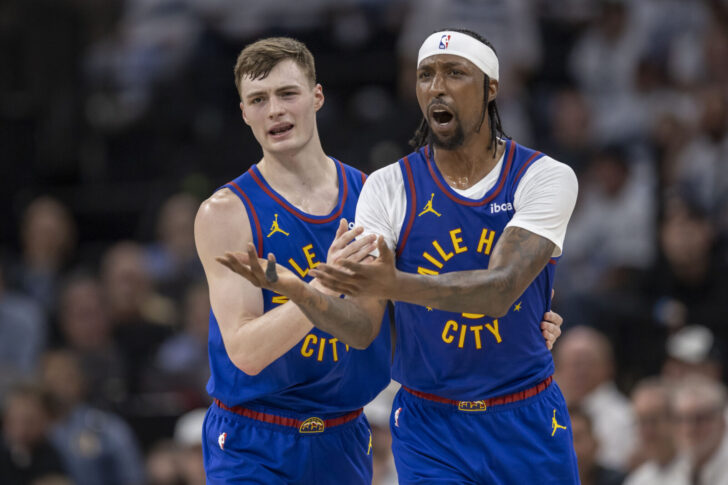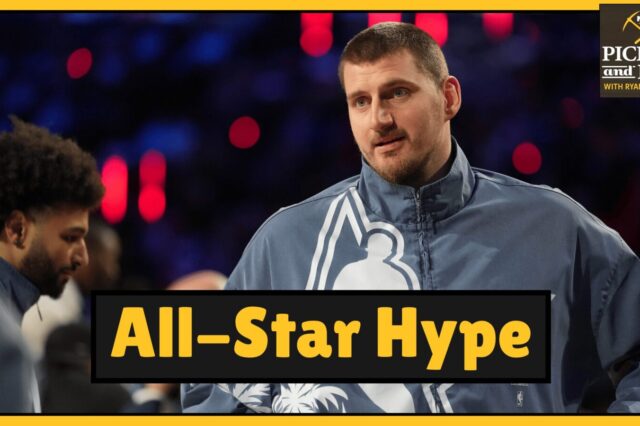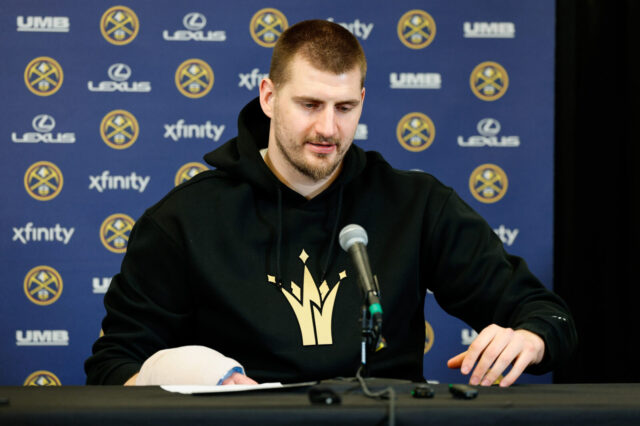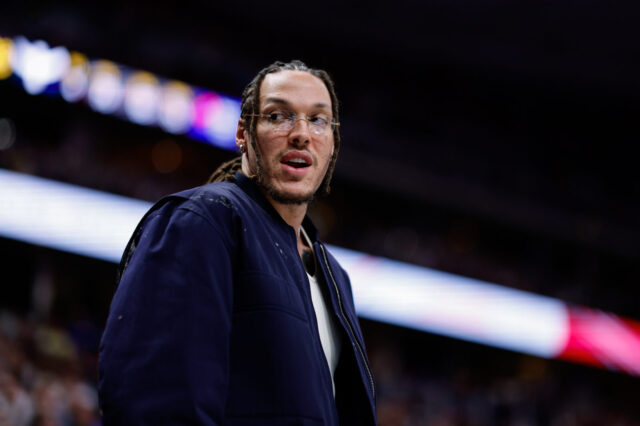Heading into the 2024 NBA offseason, the Denver Nuggets had work to do, tightening up the rotation, adding depth and potency to the second unit, and retaining one of the best (if not the top) starting units in the NBA.
On the eve of free agency, Nuggets fans are scratching their heads a bit.
The 2024 NBA Draft looked like a clear success. Denver hoped to add DaRon Holmes, shouting it from the rooftops for every team to hear. Other organizations started to pay attention and realized, “Hey, DaRon Holmes is pretty good, maybe we should draft him?” The Nuggets made it happen anyway, though it took three second round picks to move up six spots to get it done. In the end, Holmes was their guy, and I expect him to be good sooner than later.
Then, the Nuggets salary dumped Reggie Jackson, their sixth man, and cut off several ways of upgrading their roster.
On Thursday, the Nuggets surprised everyone with a trade with the Charlotte Hornets, sending Jackson along with their three remaining future second round picks to shed his $5.25 million salary. The reason he wasn’t already off the books? The Nuggets offered him a player option when they used their Taxpayer Mid-Level Exception, an odd piece of business last offseason in a contract that was very questionable at the time.
So, the Nuggets paid the piper this offseason. In two separate moves, the Nuggets spent six second round draft picks. They added one player, a rookie contract in Holmes. They lost a player who, while not irreplaceable, was the only bit of matching expiring salary they had to offer in trades this offseason. It was perhaps their only pathway to adding a legitimate replacement for Kentavious Caldwell-Pope.
So, why did they do it? Is $5.25 million worth three second round picks? Exactly 24 hours later, the Dallas Mavericks and Detroit Pistons agreed to a similar trade featuring Tim Hardaway Jr., sending his $16.2 million expiring salary along with three second round picks and taking back young wing Quentin Grimes in the process. What was wrong with that deal for Jackson?
Perhaps it had something to do with luxury tax savings, though that doesn’t quite make sense when the Nuggets are expected to compete for a championship around Nikola Jokic, the best player in the world.
And why did the Nuggets have to trade Jackson anyway? It’s speculated that Nuggets general manager Calvin Booth hoped to free up playing time for second-year point guard Jalen Pickett, who played just 122 minutes in his rookie season. That was a point of contention between Booth and head coach Michael Malone, who decided to play Jackson in all 82 games and never offered Pickett a chance at real playing time.
I don’t really have any sympathy for either Booth or Malone in this situation. Booth wants the Nuggets to continue to develop young talent on their bench while their starters stick together, but that’s not how championship contending teams are generally run. Malone, already playing Christian Braun, Peyton Watson, Zeke Nnaji, and even Julian Strawther, probably drew the line at needing a veteran point guard. It was a completely understandable notion with a bench still taking baby steps at the NBA level.
And yet, 82 games for Reggie Jackson is quite clearly a bridge too far. Malone ran his veterans into the ground, something he admitted to after the season. The Nuggets had nothing in the tank for Game 7 of the second round, and there’s zero reason to believe they would have had more to offer deeper in the playoffs. Murray wasn’t at his expected level, nor was Michael Porter Jr. or frankly, Nikola Jokic. They weren’t winning a title with this group this year, and everyone in the organization, including Malone and Booth, share some fault in that.
So, how has the team responded this offseason? Well, they’re adding another rookie, trading away the player who played the sixth most minutes, and likely to lose Caldwell-Pope, who played the third most minutes. Booth was not shy about his opinion that a player like Christian Braun could mostly replace Caldwell-Pope’s impact. It’s actually an opinion I agree with…to a point.
See, the Nuggets are slowly fading away.
In the 2022-23 season, the Nuggets had both elite talent and elite depth, an eight-man rotation that could be trusted and fit together really well. In 2023-24, the Nuggets elected not to replace Bruce Brown, and their depth suffered in a playoff environment. It was Braun and general afterthought Justin Holiday that made the most impact in the postseason, not Watson, Nnaji, Strawther, or either Jackson or Pickett. Malone only really trusted his starters, and it’s not difficult to understand why.
Now, if the Nuggets lose a starter in Caldwell-Pope, they’re elevating Braun into the starting unit. Braun will be a better player as he continues to age and develop, but it’s the talent behind him I’m more concerned with. Are the Nuggets really expecting a 2024-25 bench rotation of Pickett, Strawther, Watson, and rookie DaRon Holmes to be any better than the 2023-24 group? That can’t be the extent of their plans. It’s not good enough.
Denver needs to replenish talent, and they can’t simply count on unproven young players to do so. They need stability. They need trustable options who have been in the playoffs before. You need to know how players respond to pressure, and young players are extremely unpredictable in that regard when every possession matters.
The Nuggets will have the Taxpayer Mid-Level Exception at their disposal if Caldwell-Pope departs in free agency, and perhaps they can add someone worth $5.18 million next season. That doesn’t include Paul George and Klay Thompson, who have been connected in recent days to Denver, but I’m told are extremely, extremely unlikely to consider the Nuggets at the price Denver can offer.
So, who is it? De’Anthony Melton is a player that makes some sense as a hybrid between Caldwell-Pope and Bruce Brown but is unlikely to sign for the TP-MLE. Could Monte Morris or Kris Dunn assist Denver’s bench creation woes? That would immediately place a road block in front of Pickett, which might be the right call for Denver but doesn’t appear to be Booth’s view of the situation.
Perhaps a couple veteran wings and forwards like Gordon Hayward, Jae Crowder, or Eric Gordon would consider Denver a landing spot. Perhaps the Nuggets add a big man like Dario Saric, Daniel Theis or Drew Eubanks just in case Holmes isn’t ready immediately.
Is that good enough? Can the Nuggets simply elevate Braun to a starting spot, fill in the bench with an average veteran or two, and continue onward?
It doesn’t seem good enough to me, but I’m not the person the Nuggets have to convince. That’s Nikola Jokic, who has been notably silent in the vast majority of offseason moves every single season. He doesn’t want to offer input. He wants to be left alone, go to Serbia in the offseason, and come back to play basketball with his team. I can’t help but wonder where his head’s at in all of this. He’s never said anything to make anyone think he would leave Denver, and I don’t think he’s considering it now.
But if the Nuggets lose Bruce Brown and Kentavious Caldwell-Pope in back-to-back offseasons and don’t seriously replace them, who will be next? Aaron Gordon has a player option in 2025. The Nuggets should probably agree to an extension with him as soon as possible. They locked in Jamal Murray through 2030. Michael Porter Jr. is in Denver through the next three seasons.
Calvin Booth once called himself the steward of the Nikola Jokic era. Jokic has four seasons on his contract left to go. The team is now out of draft picks, save for a 2031 first round pick, and their only avenues for upgrading talent are trading the players Booth has selected in the draft.
Denver’s core group is mostly locked in for the next couple of seasons, so it would be nice to retain Caldwell-Pope as well. It’s Caldwell-Pope’s decision whether he stays, but if he does end up leaving, it sure would be nice to have a tangible solution lined up that isn’t just “next man up.”
I’m worried for the Nuggets. I’m worried that the talent around the league is at a higher level than ever before, and there are more contenders than ever in the Western Conference. The Dallas Mavericks, Minnesota Timberwolves, and Oklahoma City Thunder appear to be here to stay. The New Orleans Pelicans just acquired Dejounte Murray without giving up any of their core. Other teams like the Los Angeles Lakers, Memphis Grizzlies, and Golden State Warriors are making moves to try to get back into the mix.
It’s an arms race in the Western Conference, and the Nuggets are slowly losing their fingers.



